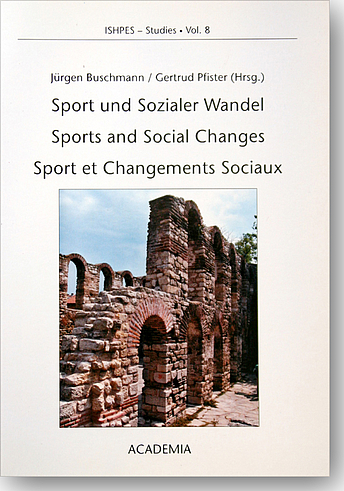Pfister | Buschmann
Sport und sozialer Wandel - Sports and Social Changes - Sport et Changement Sociaux
ISBN 978-3-89665-033-7
englischThe last ten years have seen important political, economic and socio-cultural changes not only in Europe but all over the world. These developments have had a great effect on work and leisure, and have also influenced sport and the living conditions of individuals generally. Ten years after the great political changes in Europe which marked the end of the Cold War and the partition of Germany as well as the beginning of economic and political reforms in Eastern Europe it is now time to make a first appraisal of the changes that have taken place in the field of the sport and to reflect generally on the interactions between developments in sport on the one hand and social changes on the other.
The contributions of the first part of this volume describe and analyse political, cultural and social changes in sport as well as their causes and effects in different epochs and regions, from China to Portugal and from Finland to Germany. The topics range from womens' sport and physical education at schools to workers' sports. Sport has always played a particularly important role in the production and demonstration of national identity. This is illustrated using the example of 'lieux de mémoire'. which can be places but may also be sporting activities like a journey across a continent by car.
In several contributions the economic aspects of sporting activities are examined and the reciprocal influence of economics and sport analysed. Here it becomes clear that nature sports, too - or even nature sports especially - are subject to the rules of the market as well as objects of marketing. A major focus of the contributions in this volume, however, is on the political and economic changes of the past decade and their effects on the sport system as a whole as well as on the conditions in which sporting activities take place in Eastern Europe. It can be clearly demonstrated that the price for 'liberation' from political pressures has been the loss of financial resources.
A further focus is on the 'special case' of East Germany. Here, the authors describe the sport system and the mechanisms which contributed to its functioning as well as the reality experienced in different sports and at different performance levels. Several contributions are devoted the development of sport in the period after 1989.
In den letzten 10 Jahren haben sich nicht nur in Europa, sondern weltweit tiefgreifende politische, ökonomische und sozio-kulturelle Veränderungsprozesse vollzogen, die Arbeit und Freizeit, aber auch den Sport und insgesamt die Lebensbedingungen der Menschen in starkem Maße beeinflußten. 10 Jahre nach der 'Wende', die den 'kalten Krieg' und die Teilung Deutschlands beendete und wirtschaftliche und politische Reformen in Osteuropa einleitete, ist es Zeit, nicht nur eine erste Zwischenbilanz im Bereich des Sports zu ziehen, sondern auch generell über die Wechselwirkungen zwischen Sportentwicklungen und gesellschaftlichen Veränderungen nachzudenken.
Im ersten Teil dieses Bandes linden sich Beitrage, in denen politische, kulturelle und soziale Veränderungen im Sport, sowie ihre Ursachen und Auswirkungen in verschiedenen Epochen und Regionen, von China über Finnland und Deutschland bis Portugal, beschrieben und analysiert werden. Die Themen reichen dabei vom Frauensport über den schulischen Sportunterricht bis zum Arbeitersport Eine besonders wichtige Rolle spielte der Spurt für die Produktion und Demonstration nationaler Identität. Dies wird am Beispiel von 'Erinnerungsorten'. dir sowohl Plätze aber auch sportliche Aktivitäten wie Durchquerungen eine Kontinents im Auto sein können, nachgewiesen
In mehreren Beiträgen werden die ökonomischen Aspekte sportlicher Aktivitäten und die gegenseitigen Beeinflussungen von Wirtschaft und Sport untersucht. Hier wird u.a. gezeigt, daß auch oder vielleicht gerade 'Natursportarten' den Bedingungen des Marktes unterliegen und 'vermarktet' werden.
Beitrage über die politischen und ökonomischen Veränderungsprozesse und ihre Auswirkungen auf den Sport in Osteuropa bilden in diesem Bund einen wichtigen Schwerpunkt. Dabei wird vor allem auch deutlich, daß die 'Befreiung' von politischen Zwängen mil dem Verlust von finanziellen Ressourcen erkauft werden mußte. Ein weiterer Schwerpunkt wird dem 'Sonderfall' DDR gewidmet Dabei werden das Sportsystem und die Mechanismen, die zu seinem Funktionieren beitrugen, ebenso beschrieben wie die Sportrealität in verschiedenen Sportarten und auf verschiedenen Leistungschritten. In einigen Beiträgen wird auch die Entwicklung des Sports in der 'Nachwendezeit' berücksichtigt.


